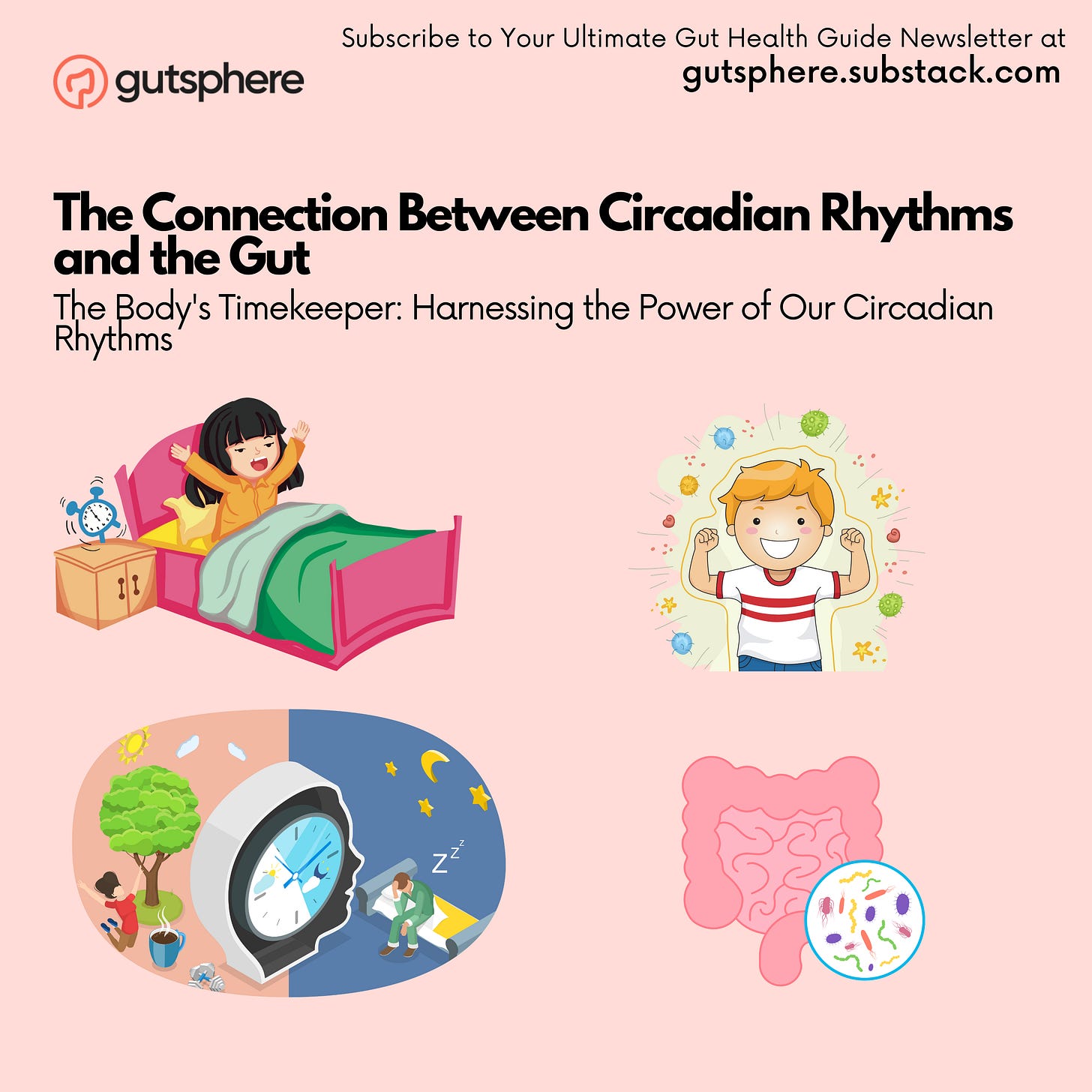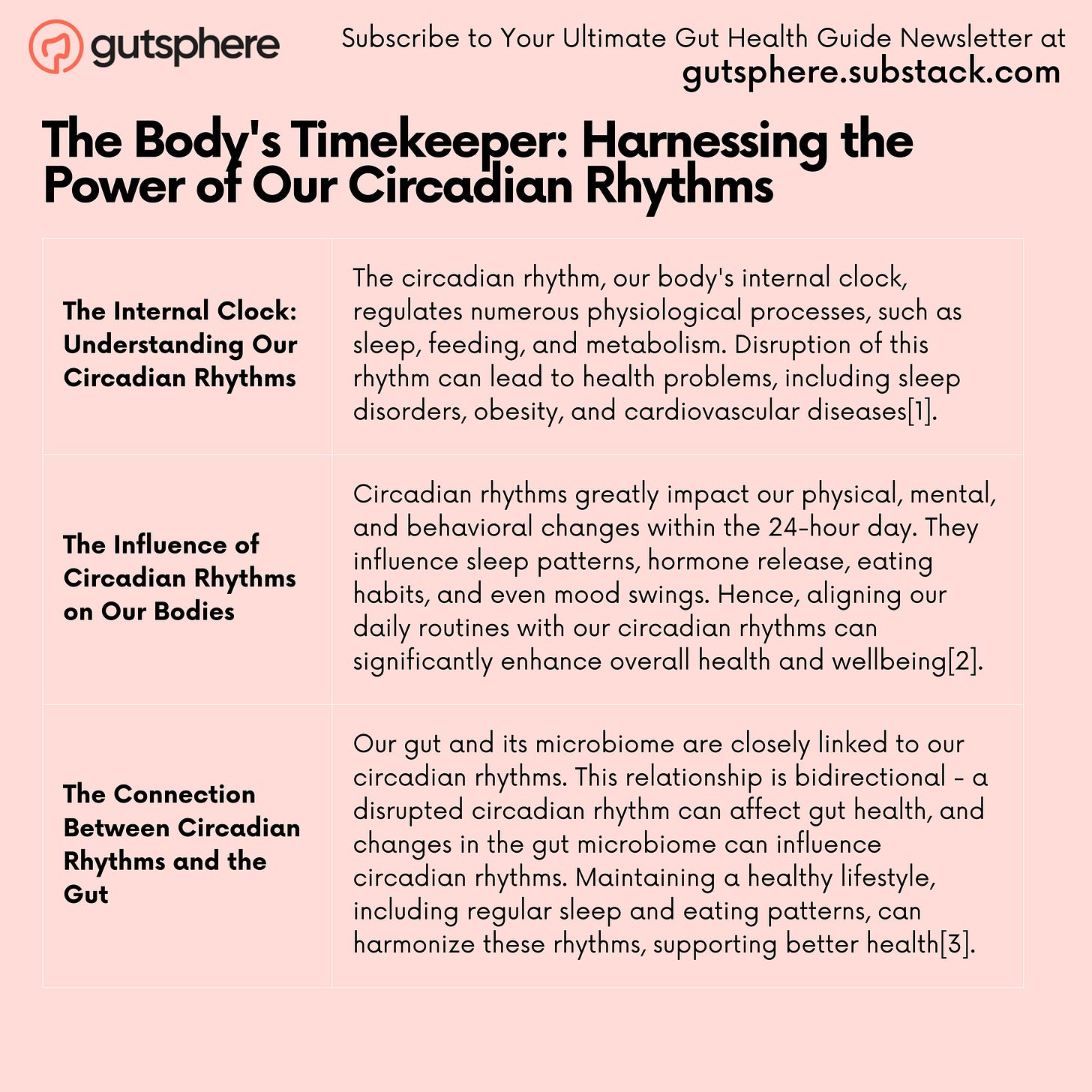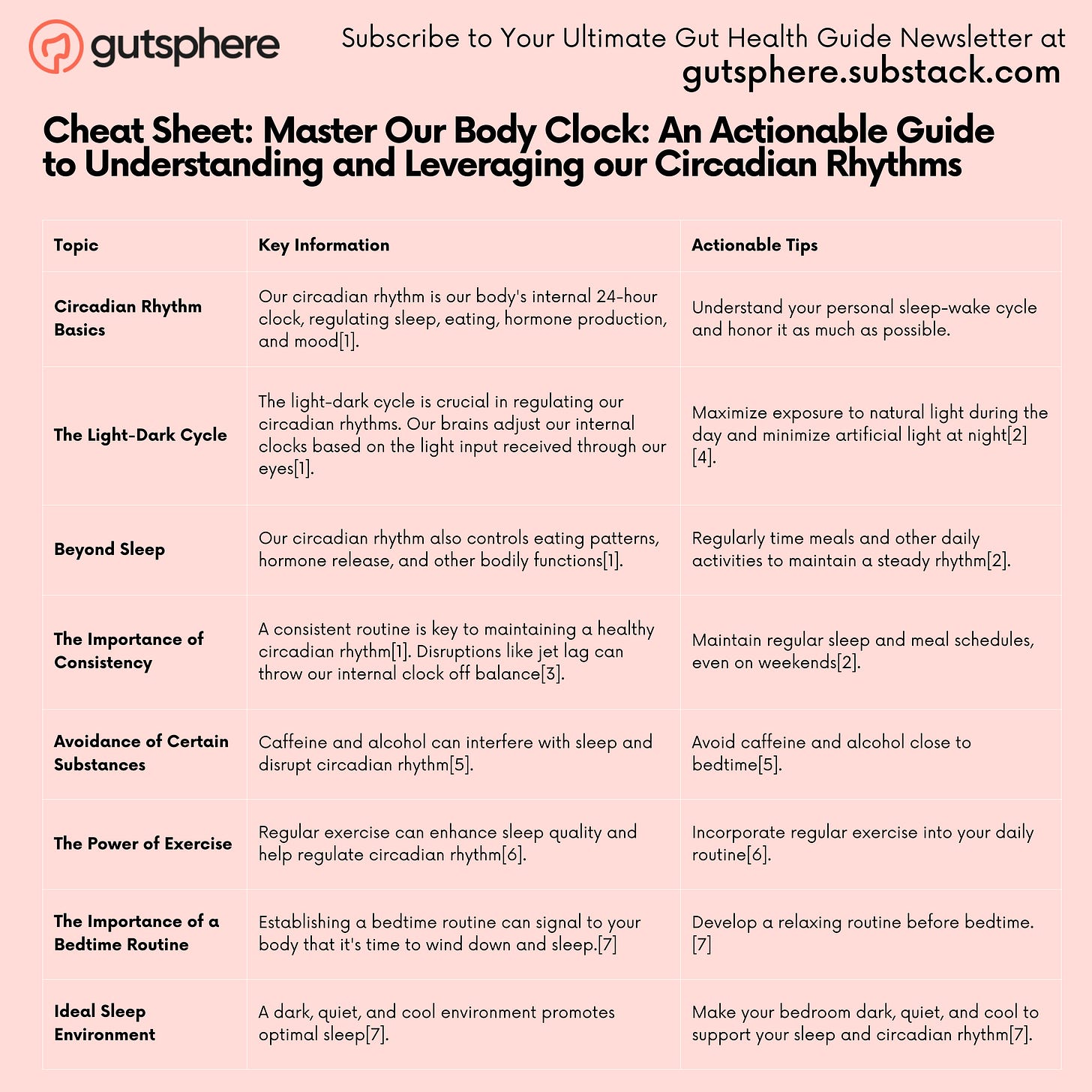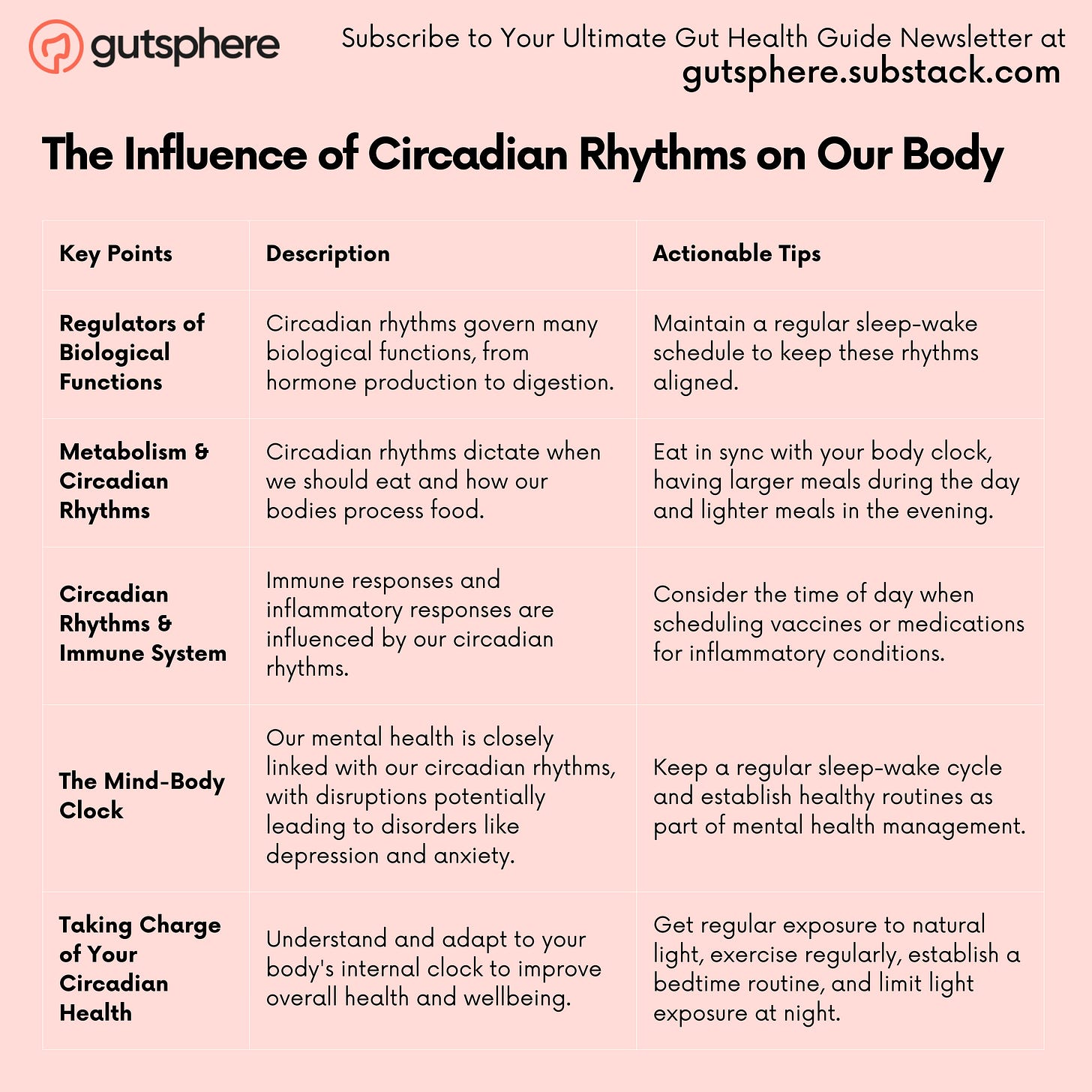The Connection Between Circadian Rhythms and the Gut (part 4)
The Body's Timekeeper: Harnessing the Power of Our Circadian Rhythms
Hello again, GutSphere community!
As we continue our exploration into the mysterious world within us, we now turn our attention to a captivating rhythm - a rhythm so fundamental to our life that it can govern the ebb and flow of our daily activities, our health, and even the behavior of our gut microbes. This rhythm is known as the circadian rhythm, our internal body clock.
In this part, we embark on a new adventure to understand the intricacies of our circadian rhythms. Our journey begins with delving into the inner workings of this biological timekeeper. It's as though we all have a grand clock within us, ticking away, helping guide our bodies through the 24-hour cycle of a day.
We will then investigate how these rhythms profoundly influence our bodies. From our sleep and eating patterns to hormone regulation and cellular activities, the circadian rhythms hold sway over numerous aspects of our wellbeing.
Finally, we'll draw the curtains to reveal an intriguing connection - the intricate interplay between our circadian rhythms and our gut. It turns out our gut microbes don't just respond to what we eat, but also when we eat, syncing their activities with our circadian rhythms.
Below is the summary of The Body's Timekeeper: Harnessing the Power of Our Circadian Rhythms
The Internal Clock: Understanding Our Circadian Rhythms
Let's dive straight into understanding our body's internal clock, scientifically known as our circadian rhythms.
The Foundation: What is the Circadian Rhythm?
Our circadian rhythm is like an internal 24-hour clock running in the background of our brains, cycling between sleepiness and alertness at regular intervals. This internal clock is influenced by external cues, like light and darkness, and orchestrates a wide range of bodily functions such as sleep, eating, hormone production, and even our mood.
The Light-Dark Cycle: The Master Regulator
Our circadian rhythms are primarily controlled by an area in our brain called the suprachiasmatic nucleus (SCN). The SCN receives direct input from our eyes, meaning it can detect changes in light and adjust our internal clock accordingly. It's why we naturally feel alert when the sun is up and sleepy when it's dark.
Circadian Rhythms: More Than Just Sleep
While sleep is a significant part of our circadian rhythm, it's far from the only one. Our internal clock also regulates eating patterns, hormone release (like cortisol and melatonin), body temperature, and other important bodily functions. When our circadian rhythm is in sync, we're more likely to feel energized and alert during the day and ready for sleep at night.
The Power of Consistency
A key aspect of maintaining a healthy circadian rhythm is consistency. That's why jet lag feels so terrible: suddenly changing time zones throws our internal clock out of whack. Keeping a regular sleep schedule, even on weekends, helps keep our circadian rhythms steady.
Actionable Tips for a Healthy Circadian Rhythm
Stick to a Schedule: Aim for a consistent sleep and wake time each day. Regularity is king when it comes to circadian health.
Get Bright Light During the Day: This helps keep your circadian rhythm healthy, improving daytime energy, as well as nighttime sleep quality and duration.
Turn Down the Lights at Dusk: Dimming the lights as bedtime approaches can enhance your body’s release of melatonin, a hormone that promotes sleep.
Mind Your Meal Times: Try to eat meals at the same time each day, as eating can also influence our circadian rhythms.
Remember, by paying attention to and nurturing our circadian rhythms, we're not just promoting better sleep—we're fostering better health and wellbeing overall. As we continue our journey in the upcoming chapters, we'll explore how these rhythms influence our bodies and their connection with our gut microbiome. Stay tuned!
References:
[1] National Institute of General Medical Sciences. . Circadian Rhythms. https://www.nigms.nih.gov/education/fact-sheets/Pages/circadian-rhythms.aspx
[2] Panda, S. The Circadian Code: Lose Weight, Supercharge Your Energy, and Transform Your Health from Morning to Midnight. Rodale Books.
[3] Roenneberg, T., Allebrandt, K. V., Merrow, M., & Vetter, C. (2012). Social jetlag and obesity. https://doi.org/10.1016/j.cub.2012.03.038
[4] Wright Jr, K. P., McHill, A. W., Birks, B. R., Griffin, B. R., Rusterholz, T., & Chinoy, E. D. (2013). Entrainment of the human circadian clock to the natural light-dark cycle. Current Biology, 23(16), 1554-1558. https://doi.org/10.1016/j.cub.2013.06.039
Cheat Sheet: Master Your Body Clock: An Actionable Guide to Understanding and Leveraging Your Circadian Rhythms
References:
[1] National Institute of General Medical Sciences. (2021). Circadian Rhythms. https://www.nigms.nih.gov/education/fact-sheets/Pages/circadian-rhythms.aspx
[2] Panda, S. (2018). The Circadian Code: Lose Weight, Supercharge Your Energy, and Transform Your Health from Morning to Midnight. Rodale Books.
[3] Roenneberg, T., Allebrandt, K. V., Merrow, M., & Vetter, C. (2012). Social jetlag and obesity. Current Biology, 22(10), 939-943. https://doi.org/10.1016/j.cub.2012.03.038
[4] Wright Jr, K. P., McHill, A. W., Birks, B. R., Griffin, B. R., Rusterholz, T., & Chinoy, E. D. (2013). Entrainment of the human circadian clock to the natural light-dark cycle. Current Biology, 23(16), 1554-1558. https://doi.org/10.1016/j.cub.2013.06.039
[5] Drake, C., Roehrs, T., Shambroom, J., & Roth, T. (2013). Caffeine effects on sleep taken 0, 3, or 6 hours before going to bed. Journal of Clinical Sleep Medicine, 9(11), 1195–1200. https://doi.org/10.5664/jcsm.3170
[6] National Sleep Foundation. (2021). How Exercise Affects Sleep. https://www.sleepfoundation.org/physical-activity/how-exercise-affects-sleep
[7] National Sleep Foundation. (2021). Healthy Sleep Tips.https://www.sleepfoundation.org/sleep-hygiene/healthy-sleep-tips
The Influence of Circadian Rhythms on Our Bodies
Let us delve deeper into how our circadian rhythms influence various aspects of our physical and mental health.
The Regulators of Biological Functions
Circadian rhythms aren't just about telling us when to sleep or wake. They regulate a variety of biological functions, from hormone production and digestion to body temperature and immune response[1].
This is why if our circadian rhythms are off-kilter, various aspects of our health can be affected. Disruptions in circadian rhythms can lead to a host of health issues, including sleep disorders, depression, obesity, and cardiovascular disease[2].
Interplay with Metabolism
Circadian rhythms play a pivotal role in regulating our metabolism. They dictate when we should eat, and they influence how our bodies process food. For instance, studies have shown that eating in sync with our body's natural rhythm (i.e., eating more during the day and less at night) can help optimize metabolism, improve nutrition absorption, and maintain a healthy body weight[3].
The Immune System Connection
Our immune system is also under the sway of our circadian rhythms. Studies have shown that immune responses to pathogens and vaccines can vary depending on the time of day. For instance, some vaccines have been shown to be more effective when administered in the morning[4].
The same goes for our bodies' inflammatory responses. There's a time of day when our bodies are more prone to inflammation, which is usually in the late night and early morning. Understanding this can be crucial for managing inflammatory conditions[4].
The Mind-Body Clock
Our mental health is intrinsically linked with our circadian rhythms. Depression, anxiety, and other mental health disorders have been associated with disrupted circadian rhythms[5].
This relationship goes both ways: poor mental health can disrupt your circadian rhythms, and disrupted circadian rhythms can affect your mental health. This is why maintaining a regular sleep-wake cycle and healthy routines are often part of the treatment plan for these disorders.
References:
[1] Takahashi, J. S. (2017). Transcriptional architecture of the mammalian circadian clock. Nature Reviews Genetics, https://www.nature.com/articles/nrg.2016.150
[2] Mohawk, J. A., Green, C. B., & Takahashi, J. S. (2012). Central and peripheral circadian clocks in mammals. Annual Review of Neuroscience, https://pubmed.ncbi.nlm.nih.gov/22483041/
[3] Asher, G., & Sassone-Corsi, P. (2015). Time for food: the intimate interplay between nutrition, metabolism, and the circadian clock. https://pubmed.ncbi.nlm.nih.gov/25815987/
[4] Silver, A. C., Arjona, A., Walker, W. E., & Fikrig, E. (2012). The circadian clock controls toll-like receptor 9-mediated innate and adaptive immunity. https://pubmed.ncbi.nlm.nih.gov/22342842/
[5] Wulff, K., Gatti, S., Wettstein, J. G., & Foster, R. G. (2010). Sleep and circadian rhythm disruption in psychiatric and neurodegenerative disease. Nature Reviews Neuroscience, https://www.nature.com/articles/nrn2868
Synchronizing Rhythms: The Dynamic Relationship Between Circadian Rhythms and the Gut
What does our gut have to do with circadian rhythms, and vice versa? Let's find out.
A Tale of Two Clocks
Our bodies are masterful timekeepers. Through our circadian rhythm, our body knows when to wake up, eat, work, and sleep. But did you know our gut has its rhythm too? Yes, it does! Just like the brain, the gut has its own local circadian clocks, ticking in sync with our primary clock to regulate various gut functions. It's a harmonious symphony, ensuring the optimal absorption of nutrients, gut motility, and secretion of digestive enzymes[1].
The Microbial Maestros: Gut Microbiome and Circadian Rhythms
As if this symphony wasn't complex enough, there's another group of players involved: our gut microbes. Studies have found that the gut microbiome doesn't just passively exist in our bodies; they live on a schedule. They have a day-night rhythm, with some bacteria more active during our waking hours when we're eating, and others more active when we're asleep, and our gut is in repair mode[2].
Disruptions and Disharmonies
But what happens when there's a misstep in the dance, a note out of tune in the symphony? What happens when our lifestyle disrupts our circadian rhythm through irregular sleep or eating habits? The effects can reverberate through our gut. Sleep disruptions can affect gut health and may lead to issues like gastrointestinal disorders, obesity, and metabolic diseases[3].
Moreover, the changes can flow in the other direction too. Alterations in our gut microbiome can affect our circadian rhythms, contributing to sleep and metabolic disorders. It's a ripple effect where a disturbance in one causes waves in the other[4].
Harmonizing our Rhythms: The Road to Better Health
Understanding this interplay gives us the power to better our health. By maintaining regular sleep and eating patterns, we can support our circadian rhythm and promote a healthier, happier gut. Healthy daylight exposure and a diet nourishing to the gut microbiome are two more steps in the right direction.
To sum up, our circadian rhythms and gut health are like dance partners, moving together in an intricate ballet. If one stumbles, the other may too. But by supporting their synchrony, we can potentially improve our overall health and wellbeing.
References:
[1] Thaiss, C. A., et al. (2014). Transkingdom control of microbiota diurnal oscillations promotes metabolic homeostasis. Cell, https://www.cell.com/fulltext/S0092-8674(14)01236-7
[2] Hoogerwerf, W. A. (2009). Role of clock genes in gastrointestinal motility. American Journal of Physiology-Gastrointestinal and Liver Physiology, https://journals.physiology.org/doi/full/10.1152/ajpgi.00147.2010
[3] Voigt, R. M., et al. (2014). Circadian disorganization alters intestinal microbiota. PLoS ONE, 9(5),https://journals.plos.org/plosone/article?id=10.1371/journal.pone.0097500
[4] Liang, X., et al. (2015). Rhythmicity of the intestinal microbiota is regulated by gender and the host circadian clock. PNAS, 112(33), https://www.pnas.org/doi/10.1073/pnas.1501305112
Part 4 Conclusion
To wrap up Part 4, we delved into the fascinating realm of our body's timekeeper - the circadian rhythm. We discovered how these internal clocks pervade our daily lives, influencing our physical, mental, and behavioral changes throughout the day. In understanding these rhythms, we unlock the secrets to better sleep, overall health, and wellbeing. We also learned about the intriguing link between our gut health and circadian rhythms, shedding light on the importance of lifestyle patterns in maintaining our internal harmony.
But as we all know, life isn't always in sync with our biological rhythms. The pulse of the modern world often marches to a different beat. Our next journey takes us to the frontline of these rhythm breakers - the challenges posed by our contemporary lifestyles and tech disruptions.
Next Part 5: The Modern Rhythm Breakers: Tackling Lifestyle and Tech Disruptions
Get ready to dive deep into the 21st Century's challenges. What happens when the demands of our fast-paced world collide with our natural rhythms? How does our modern lifestyle impact sleep and circadian rhythms, and in turn, our health? More importantly, how can we navigate through these disruptions and maintain our internal balance? In the next part, we'll answer these questions and offer practical solutions to tune back into our body's natural rhythm amidst the noise of the modern world. Don't miss it!
Request
Share
Our sincere request to you is to share the newsletter with your friends, family, and community so that they can benefit from the content. Also it will help us grow the newsletter, and eventually, as we release more content, digital tools, and more we will enable people around the world to live chronic disease free.
Subscribe
If you haven’t already subscribed then our sincere request, please subscribe.
Feedback
Also, please give us feedback so that we can improve the content. And if there are any topics that you want us to cover please send us your questions and topics. Furthermore, if you try any of the things we provided information please share your experience with us.
Thank You
GutSphere Team
Disclaimer
Please note that the information provided in this newsletter is for informational purposes only and should not be considered as a substitute for professional medical advice, diagnosis, or treatment. If you have any concerns or questions about our health, please consult with a licensed healthcare professional. The information contained in this newsletter is not intended to diagnose, treat, cure, or prevent any disease. The publisher and authors of this newsletter assume no responsibility for any adverse effects that may result from the use of the information contained herein.





